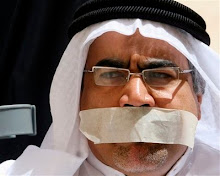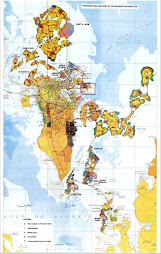Trust and Stability Necessitate Genuine Reform
Abduljalil Alsingace (PhD)
Bahrain - October 31st, 2005.
Advocates for the Bahraini regime, resisting the popular strives for indisputable changes, by insisting the myth of the need for political stability not political
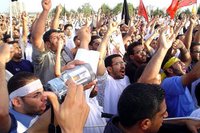 reform.
reform.Bahrainis believe that they have paid the cost of their demands, through tens of martyrs and thousands of victims tortured and agonized in the previous period. Such content in the conscious of many Bahrainis will be a strong drive to continue struggling peacefully until all demands have been fulfilled. What have been done through the past five years, have proven to have exposed the true sentiments of regime towards the Bahrainis, more than anything else. These were seen to be symptoms of false reform and deceptive acts, and will fuel further popular frustration which could easily be lit up and click widespread uprising.
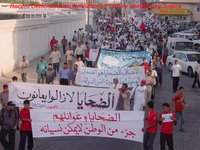
Many acts, apparently of systematic agenda, indicate the unwillingness and desire of the Al-Khalifa family to introduce genuine reform resulting in a true representation of the Bahrainis will. These are very significant issues and need to be considered seriously:
- Deepening Distrust: Single- sided Constitution and Focus of authority
What the ruler of Bahrain; Shaikh Hamad Bin Isa Al-Khalifa, did in February 2002 is to deepen the mistrust which have always been a dispute between Bahrainis and Al-Khalifa over the years. The period of the National Action Charter (NAC) showed a potential for a possible reconciliation between the two parties- The people and Al-Khalifa. As a result of openness during the year of 2001, morals and hopes were high and the sky was full of optimism. This came as a result of releasing all political prisoners, who had been detained unjust for many years, return of exiles and relative of freedom of expression. Such acts gave signals of possible permanent solution of crisis of trust. It was further reinstated by the social visits between Sh. Hamad and many dignitaries and religious leaders, during which, Sh Hamad re-iterated the reinstatement of the 1973 constitution and respect of the people's will.

A year after the popular ratification of the NAC, Sh Hamad, unilaterally and with consultation or consent of the people of Bahrain, issued his own constitution which went beyond what has been agreed upon in the NAC and the public declarations made by him and senior members of his families. The constitution converts the regime into an authoritarian regime and grants Sh Hamad a full grip of all the powers on the expense of people influential presence. Furthermore, Sh Hamad issued decrees to plot the election constituencies, which are found to be sectarian and tribally based. It ensured that its outcome of a number representatives more in loyalty to his family and guarantees control over the final decision of the House of Representatives. In addition, he made the appointed Shura council to have the upper hand in the legislation, and has the capacity to prevent the passage of unfavorable regulation.
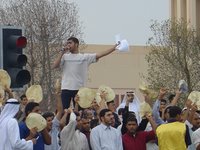
This is the first set back into what has been exemplified as a model of democracy. The will of People has been marginalized and made absentia, in contrast to all models and novice experiences of democracy.
- Persistent plan of change of demography:
The sentiment of distrust has grown deeper when the plan of the change of demography, locally known by the political naturalization, surfaced. Documents, go back early eighties, indicate that the regime has been discretely and illegally granting, in bulk of, tens of thousands of people, having an effective nationality. The naturalized are of certain religious sect, tribal and cultural background from specific areas of the world: Deir Al-zour of Syria, Sahara of Jordan, Yemen and Baluchestan of Pakistan. They are secured housing and employment once naturalized, while Bahrainis are jobless and without housing. The main purpose of this bulk and orientated naturalization is to change the demography of the Bahraini population, dilute its culture and ensure loyalty to the Al-Khalifa family.
Furthermore, tens of thousands of Al-Dowaser and other tribes of Saudi Arabia were granted the Bahraini citizenship, without the need to be in Bahrain. Documentary film produced by the opposition in July 2003 shows how these Saudis, were commuted to the borders between Saudi Arabia and Bahrain, to cast their votes in the different elections carried out in Bahrain during the period of 2001-2002. Such process became further evident in the outcome of some constituencies in October 2002 election when the winner was as the product of naturalized votes from Saudi Arabia.
The regime have not denied pursuing such plot, but further affirmed the personal responsible and executioner of such plan to the Royal King! (Akhbar Al-khaleej- March 18th, 2005-www.aaknews.com).
There are also socio-economical direct and indirect effects of this wicked plot on the Bahrainis, which inevitably have strong say on the trust and sentiments towards Al-Khalifa, who have been seen to be careless and immune against the drawback of this project.
- Embezzlement of public lands, coasts and islands
There are 40 thousands applications (10% of the citizens) of Bahrainis waiting for housing, going back to 1992. On the other hand, and beside the public lands occupied by many of Al- Khalifa and their loyalists, there are three major islands, besieged by and named after Sh Hamad and his uncles, Sh Mohammed and the tycoon and ever prime minister of Bahrain, Sh Khalifa Bin Salman. All the coasts of Bahrain, have been embezzled and named after members of Al- Khalifa family, who have shown some generosity to donate part of it to some of the Amirs of the Gulf. Furthermore, the sea lands around the major island of Bahrain, have been re-mapped, owned by influential members of Al –Khalifa, and invested it in the public market.
In the midst of persisting housing and poverty issue in Bahrain, Al-Khalifa have been investing into the main and sea lands converting it into multi-billion projects. How can such these acts bridge and strengthen the relationship between Al-Khalifa and the people of Bahrain?
- Economic and Social Predicament: Poverty, Unemployment and Housing
Report by the Bahrain Center for Human Rights shows that half of the Bahrainis live under poverty level. Official record of unemployment amounts to over 20 thousands of 400 thousand of the population. The foreign manpower exceeds 200 thousands, ensuring millions of dollars transferred outside and without a positive return on Bahrain's economy. The State has made many studies and investigations on these issues, but on the ground, no tangible and practical plan to end people's misery.
- Discrimination and Privileges:
Implementing split and rule concept, the State has taken many steps to marginalize Shia, who represent the majority of the Bahrainis, in many aspects. Politically through the distribution of the election constituencies and representation in all public offices (e.g. in the Government, there are 5 Shia out of 22 ministers, in the Appointed Shura council they are 19 out of 40, in the Elected House they have 12 seats out of 40, and in the municipality, they have 22 seats out of 50). Full details of the sectarian discrimination could be traced in the Report made by the Bahrain Center for Human Rights issue October 2003 and titled "Discrimination and Privileges: The Unwritten Law".
Economically, they represent the highest percentage of citizen suffering poverty and unemployment. Their areas are the least attended to and are less of infrastructure facilitation. They are discriminated at from religious practices as well as benefiting from media and education aspects.
On the other hand, members of Al-Khalifa family and their loyalists enjoy special privileges and gestures, high ranking employment, scholarships, promotions to higher posts, wealth and exceptional services.
Such attitude, especially among Shia citizens, would inevitably fuel resentments and sentiment of marginalization. It would never help strengthening the relationship between citizens and the ruling family. Sectarian discrimination would create an environment of hater and crisis, a conclusion reached by the ICG report of the May 6th, 2005 about Bahrain.
- Suppression of Public Liberties and Civic Movements
- The State has taken all measures to prevent, stop and threaten public gatherings which were seen to talk or indicate any official misconduct and abuse of power eg. Unemployed gatherings. Gathering for Housings, Gathering of Victims of Torture.
- The State has maintained old legislations which are in clear violation to all universal declarations, among which are the Penal, the Civic Societies, the Press and Publications and the Gathering Codes. The State has also introduced new codes which arenot compatible with all international agreements and Universal declaration, among which are the Impunity (protecting torturers from fair trials) and the new Political Societies. Furthermore, the State has drafted codes which will terminate any sign of active and normal life for activists and citizens to exercise their rights of freedom of expression. These are particularly the codes of Public Gathering and Procession (new version of the 1973 code), Combating Terrorism, and National Security.
- The State has taken measures to dissolve human rights organizations like the Bahrain Center for Human Rights since September 2004 and physically attacked and beaten human rights activist in June and July 2005.
- It has also taken means to harass human rights defenders in their employment and social life, taping and monitoring their personal telephone lines and emails as well as chasing and trailing defenders when meeting international activists and journalists visiting Bahrain. The State has gone further by Spreading false and antagonized sms messages about these activists and their families and prevented them from access to media and all means of reach to public through public establishments
Demands and Remedial Solutions:
- A democratic regime governed by a socially binding constitution enabling full and independent power of legislation and oversight have always been a popular demand by people of Bahrain. The popular struggles in Bahrain will persist until such demand is fulfilled and achieved. The will of people has to be respected and made to be the upper hand.
- Appointed councils should not exercise any legislative role and would respect fair representations of the Bahraini society.
- Election Constituencies should not intensify discrimination among citizens and should treat them equal in privileges and representations.
- Change of demographic plans should be stopped and ways of reversing it should be implanted to reflect good faith of protecting Bahrain original identity and culture.
- Embezzled coasts, islands and public lands should return to the public consumption, benefit and enjoyment. Corruption should cease and transparency should prevail.
- All forms of discrimination (racial, sectarian, sex, ethnic) should be stopped and criminalized and ways of correcting the situation should be pursued.
- Bahrainis should benefit from all wealth equally well, and practical schemes to solve unemployment and housing problems should be implemented.
- Old and new Legislations should not strip people from any inherent or gained rights and should not violate universal declarations and international agreements. This include all codes curtailing and limiting freedom of association, freedom of expression and rights of victims of torture.






